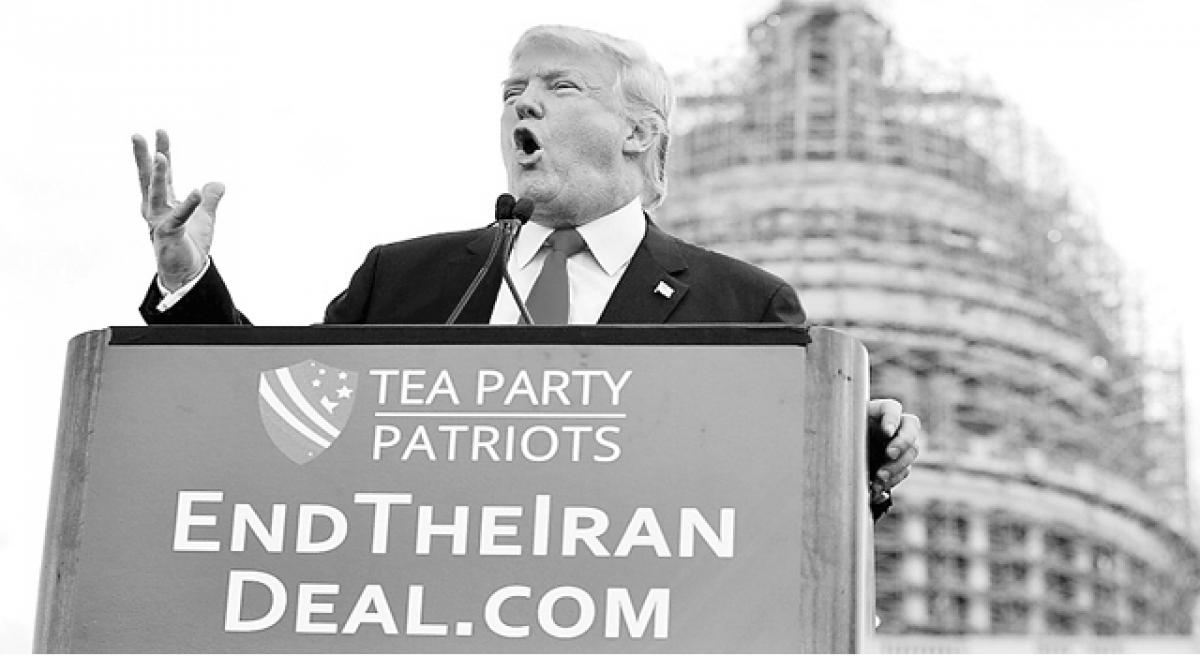Live
- I don't want to disrespect anyone with my films: Anurag Palutla
- Myntra's Big Fashion Festival to kick off on Sep 26 with 3.4 mn trend-first festive fashion styles
- World Barber's Day Celebrated by Nayi Brahmin Community in Aiza.
- Santosh Kashyap appointed as new head coach of Indian women's football team
- CP Sudheer Babu Makes Surprise Visit to Medipally Police Station
- Fashionista Goodapati Pravallika Inaugurates D sons patola art Expo at Banjara Hills
- Idea behind competitive fielding drill was to get everyone together as a team, says T Dilip
- Congress manifesto promises full statehood for J&K, silent on Article 370 (Ld)
- BJP fielding other parties to cut votes of Congress, says Hooda
- Chandrababu Naidu Explains Importance of Green Energy Revolution
Just In

Outgoing President Barack Obama\'s administration touted the deal, a legacy foreign policy achievement, as a way to suspend Tehran\'s suspected drive to develop atomic weapons. In return Obama, a Democrat, agreed to a lifting of most sanctions.
Washington : Donald Trump's election as President raises the prospect the United States will pull out of the nuclear pact it signed last year with Iran, alienating Washington from its allies and potentially freeing Iran to act on its ambitions.
Outgoing President Barack Obama's administration touted the deal, a legacy foreign policy achievement, as a way to suspend Tehran's suspected drive to develop atomic weapons. In return Obama, a Democrat, agreed to a lifting of most sanctions.
The deal, harshly opposed by Republicans in Congress, was reached as a political commitment rather than a treaty ratified by lawmakers, making it vulnerable to a new US President, such as Trump, who might disagree with its terms. A Republican, Trump ran for the White House opposing the deal but contradictory statements made it unclear how he would act. Trump will succeed Obama on January 20.
A businessman-turned-politician who has never held public office, Trump called the nuclear pact a "disaster" and "the worst deal ever negotiated" during his campaign and said it could lead to a "nuclear holocaust." In a speech to the pro-Israel lobby group AIPAC in March, Trump declared that his “Number-One priority” would be to “dismantle the disastrous deal with Iran.”
He said he would have negotiated a better deal, with longer restrictions, but somewhat paradoxically, he criticised remaining US sanctions that prevent American companies from dealing with Iran.
By contrast, he has conceded it would be hard to destroy a deal enshrined in a United Nations resolution. In August 2015, he said he would not “rip up” the nuclear deal, but that he would “police that contract so tough they don’t have a chance.”
Iran denies ever having considered developing atomic weapons. But experts said any US violation of the deal would allow Iran also to pull back from its commitments to curb nuclear development.
Those commitments include reducing the number of its centrifuges by two-thirds, capping its level of uranium enrichment well below the level needed for bomb-grade material, reducing its enriched uranium stockpile from around 10,000 kg to 300 kg for 15 years, and submitting to international inspections to verify its compliance.
The nuclear deal was divisive in Iran, with hardliners opposed to better relations with the West arguing that pragmatist President Hassan Rouhani was giving up too much of the country’s nuclear infrastructure for too little relief.
Some of Washington’s closest Middle East allies have been skeptical of the nuclear deal. Israeli Prime Minister Benjamin Netanyahu has been outright hostile. Gulf leaders say the deal has emboldened Iran's pursuit of regional hegemony in part through support for proxy groups fueling regional conflicts.
Iranian Supreme Leader Ali Khamenei has already promised to “set fire” to the nuclear deal if the West violates it. Iran has repeatedly complained it has not received benefits promised. Though European companies have been eager to explore business prospects in Iran, few deals have been enacted in part because European banks have been reluctant to finance deals involving Iran.
As to whether he can negotiate a ‘better’ deal, it takes two (or seven) sides to agree to begin that process, something I rate as highly unlikely,” said Zachary Goldman, executive director of the Center on Law and Security at New York University and a former US Treasury official.
And if we walk away from the deal I think we will be in the worst of all worlds – Iran will feel freed from its commitments and we may be blamed for the deal falling apart.”

© 2024 Hyderabad Media House Limited/The Hans India. All rights reserved. Powered by hocalwire.com







